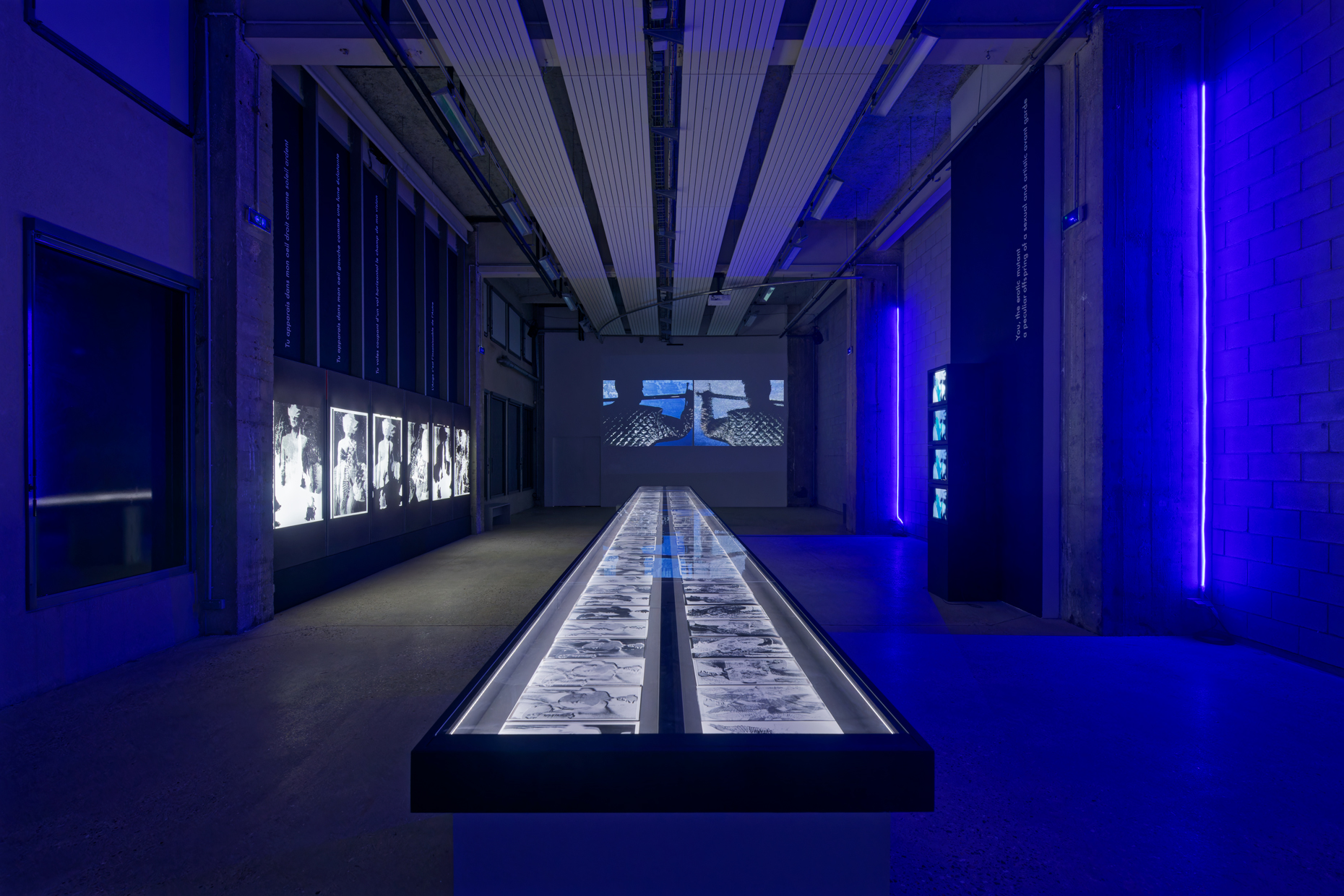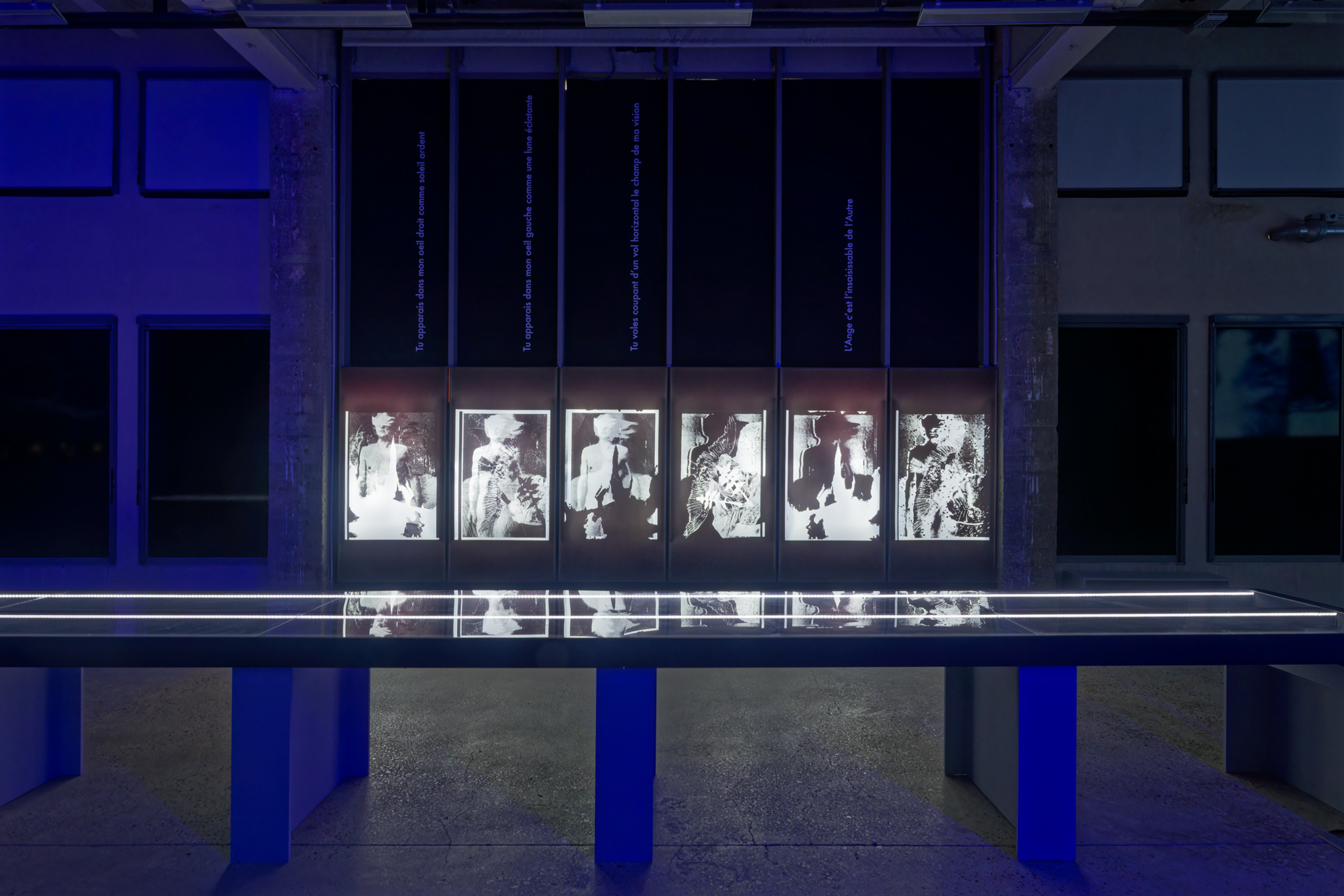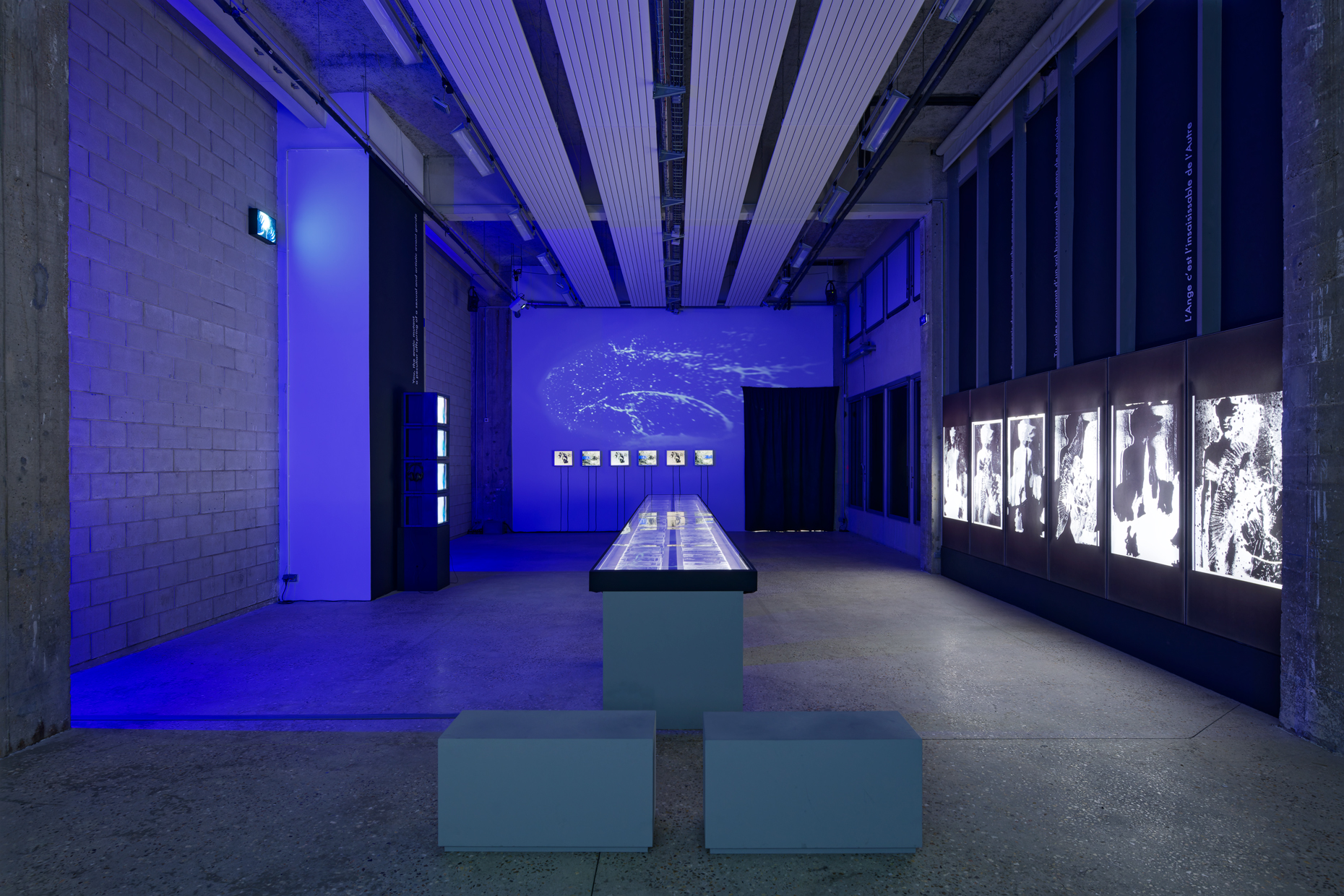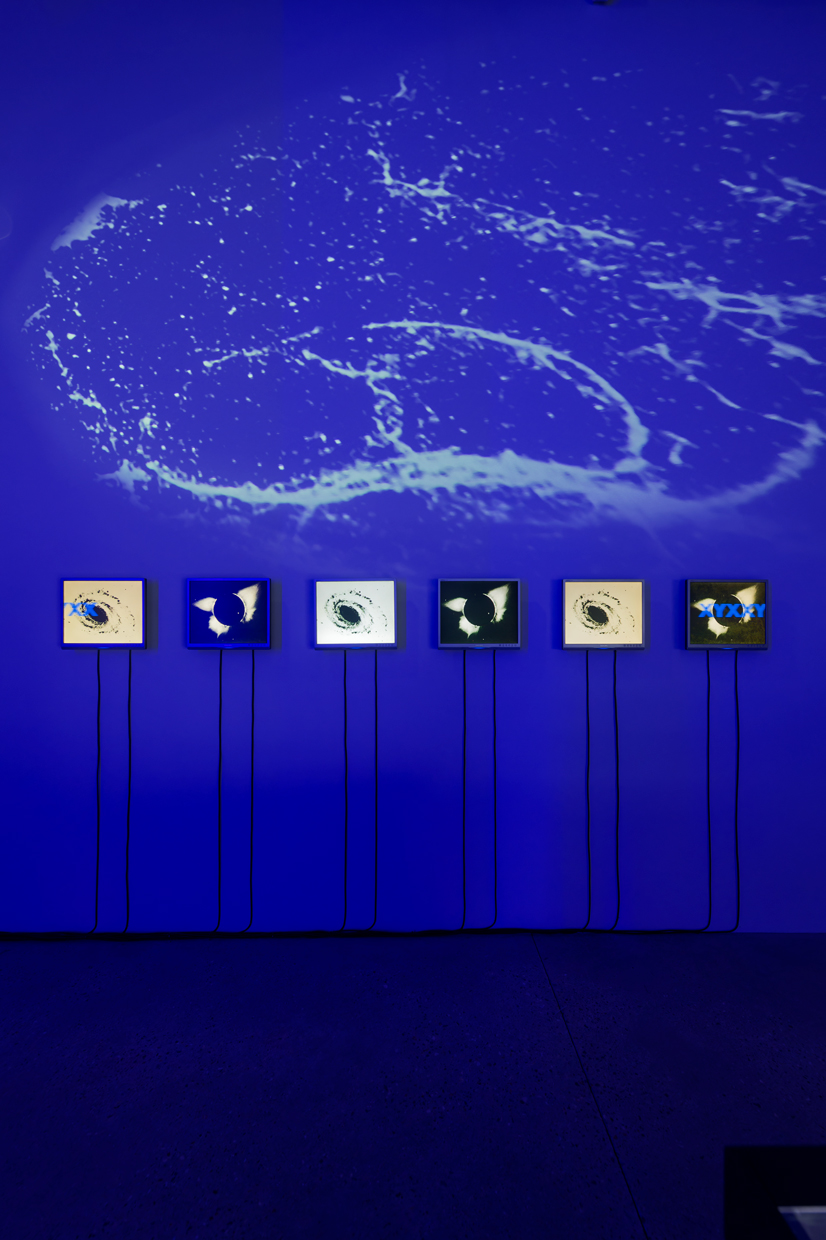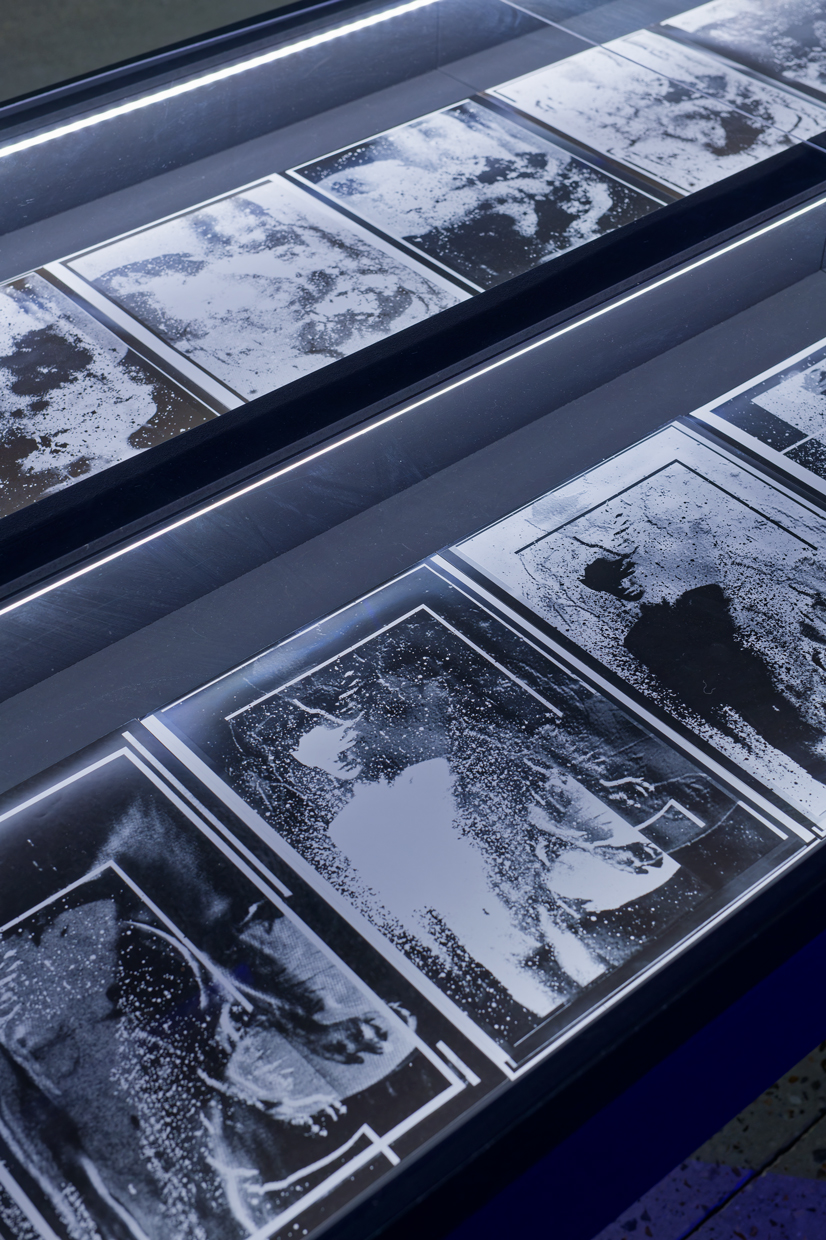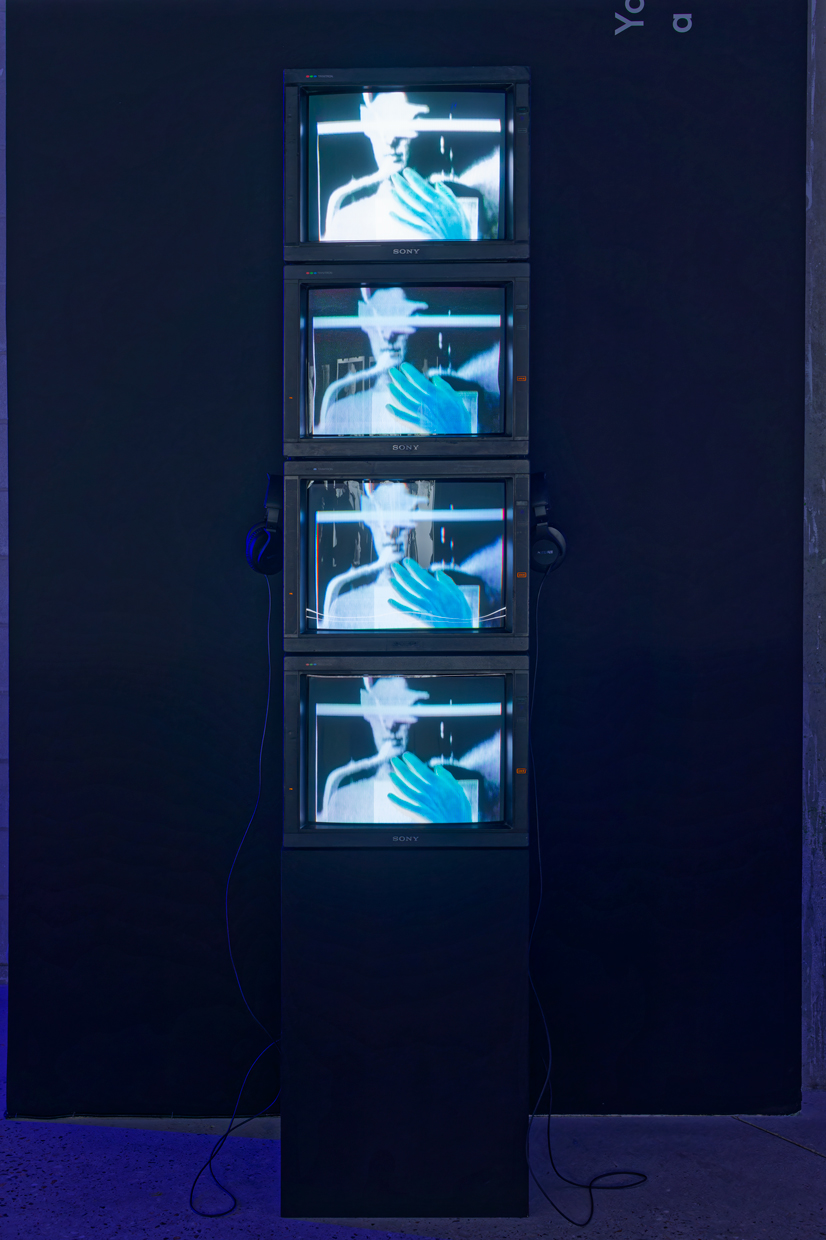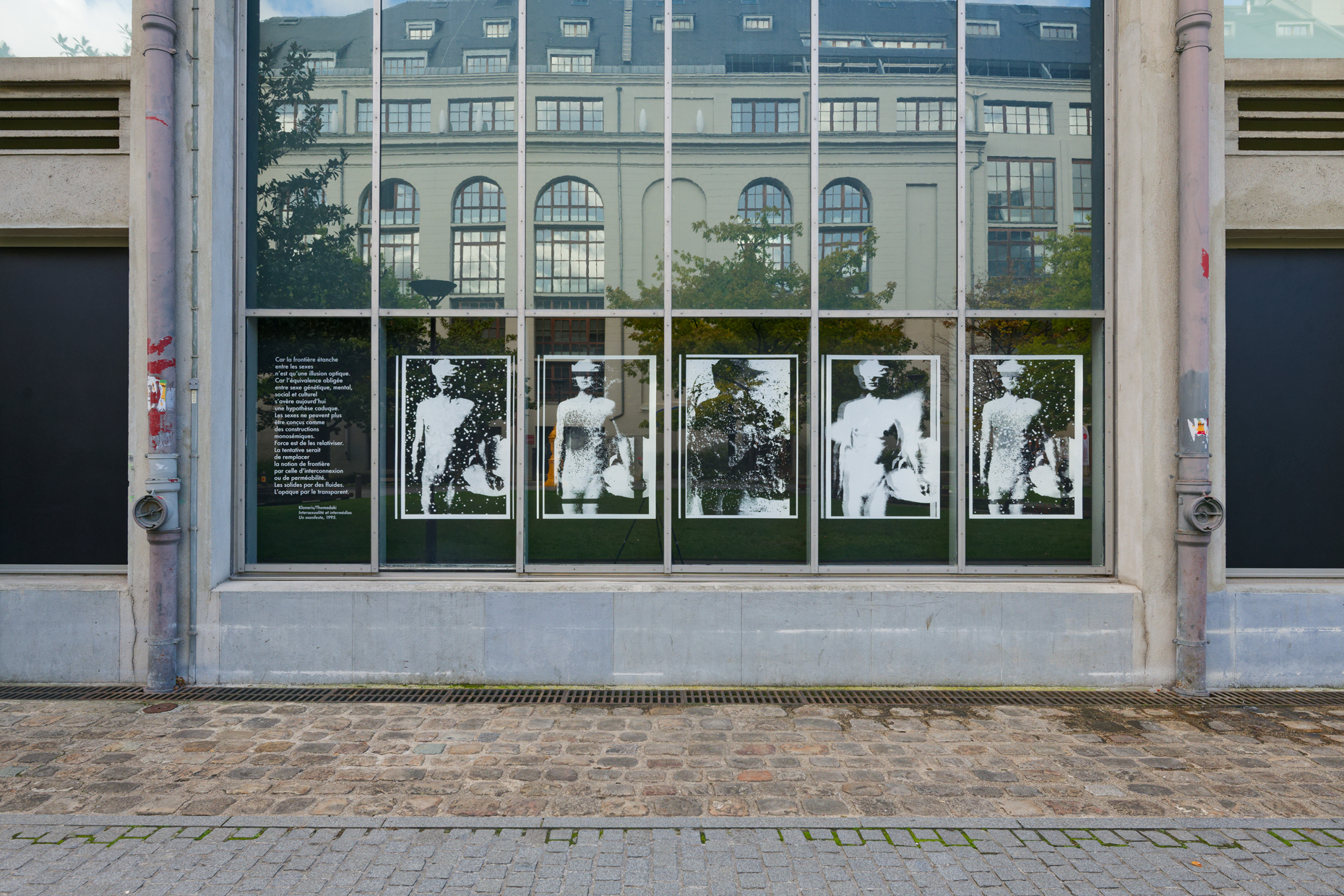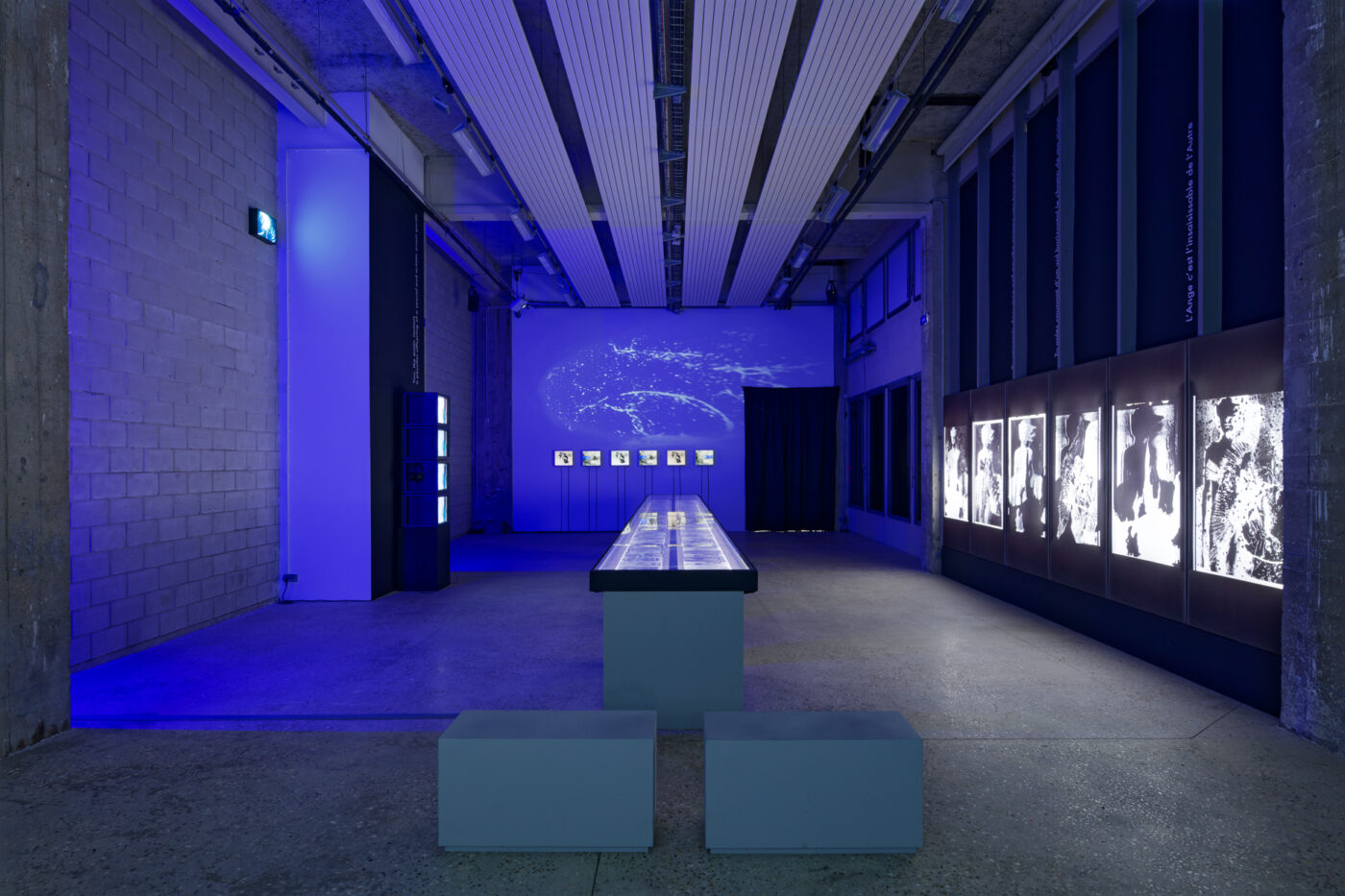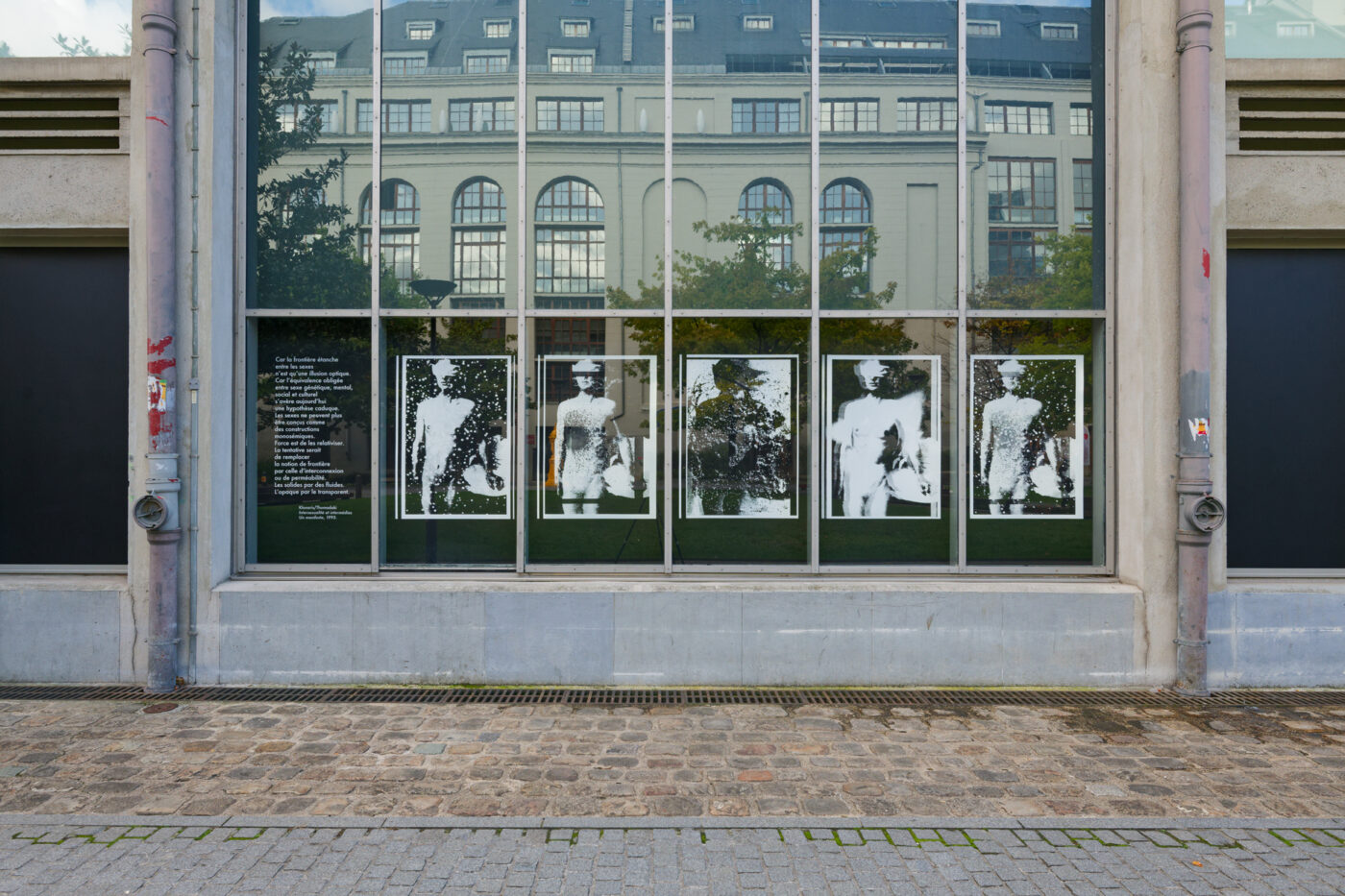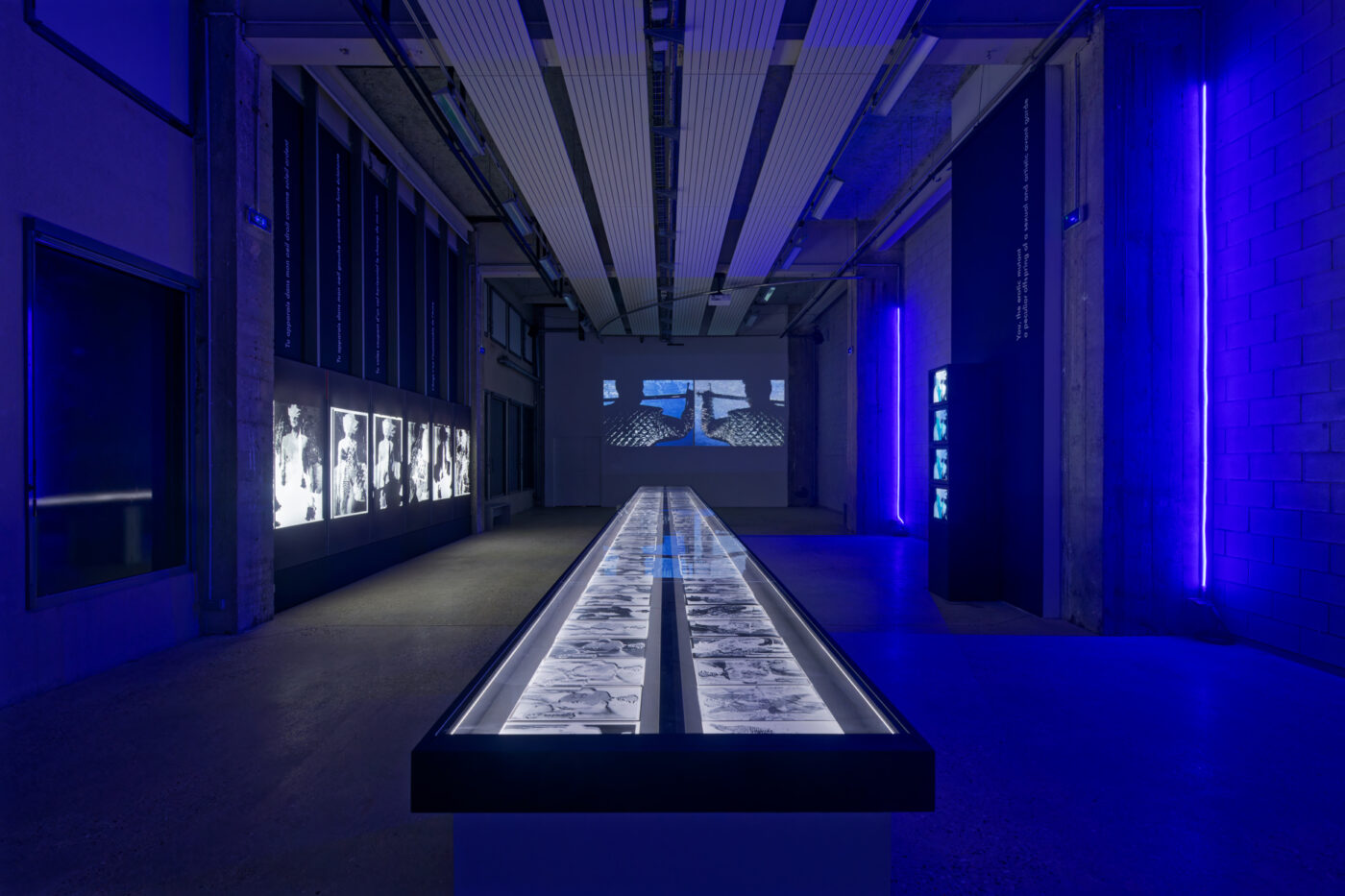
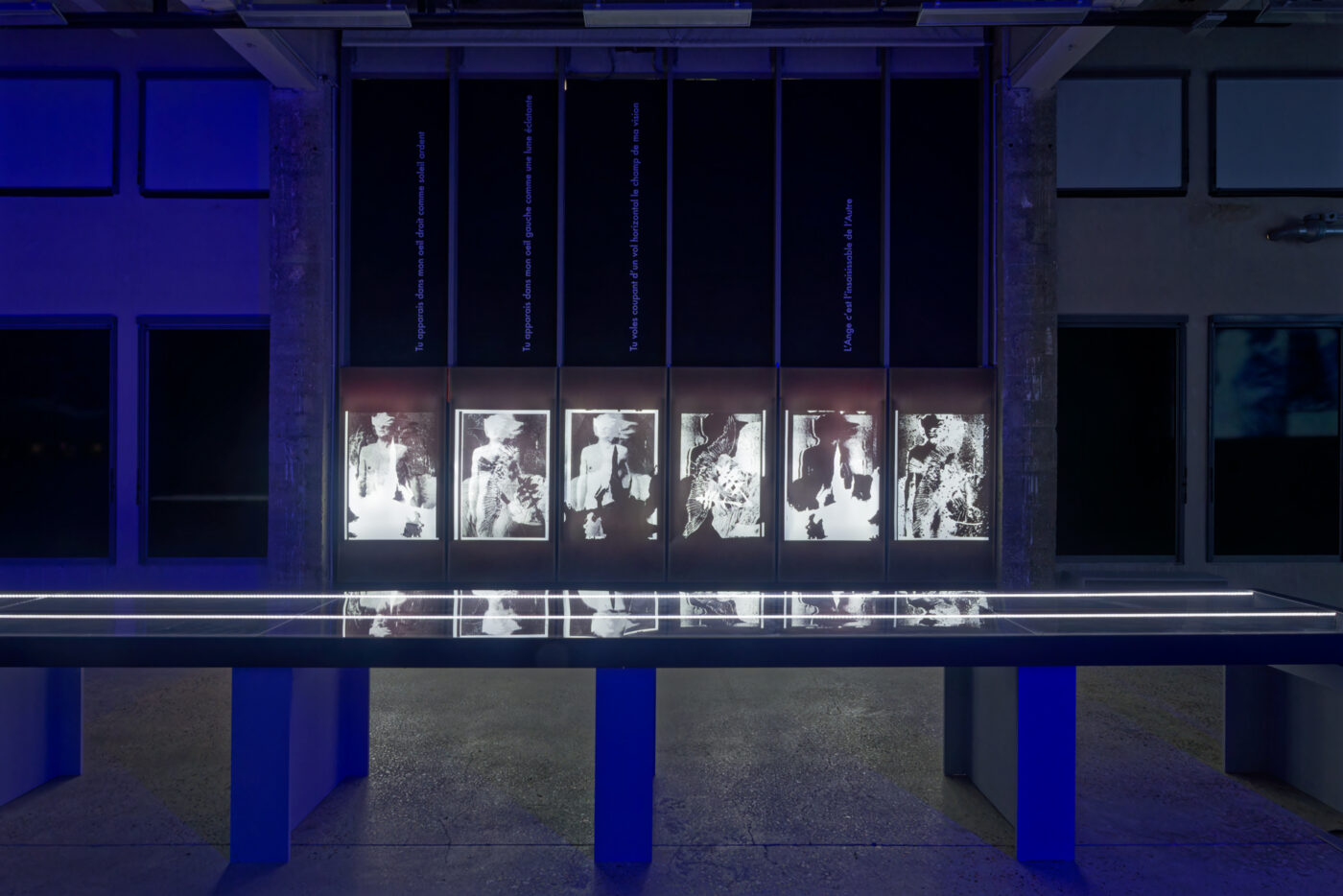
I encounter the Angel in your ecstasy
Klonaris/Thomadaki
An installation created by Katerina Thomadaki, dedicated to Maria Klonaris
Since the 1970s, artists and filmmakers Maria Klonaris and Katerina Thomadaki have never ceased to break new paths and express their dissident positions, in hybrid, protean artworks abolishing the conventional boundaries between artistic media, cultures, and fields of knowledge. From the beginning, the artists have laid claim to a “double female authorship” proposing — in their Cinéma corporel — a “radical femininity” capable of “shattering all that weighs on it and constrains it”, beginning with the binary opposition of male and female. A concept further developed in their major cycles of works inspired by other “dissident bodies”: the Hermaphrodite (1982–90); the intersexual “Angel” (1985–2024); the conjoined twins (1995–2000). By revealing the power of these figures to transgress symbolic — as well as biological and anatomical — norms, Klonaris and Thomadaki have very early on contested the ideology of “nature” as a static order, thus anticipating current debates and theories concerning gender and the materiality of bodies.
Today, at Bétonsalon, a decade after the passing of Maria Klonaris, Katerina Thomadaki revisits and extends the Cycle de l’Ange [The Angel Cycle], which the two artists launched in 1985 and developed together over three decades. This vast ensemble of artworks, created in a variety of media — photography, video, sound, text, performance, installation — begins with a medical photograph: an intersexual person associated by the artists with the angel — a herald announcing the collapse of gender. In their artworks, the intersexual body is not reduced to an object of observation, pathologized by the medical gaze. On the contrary, the artists assert its multifarious and elusive character as it becomes the subject of infinite metamorphoses through multiple hybridisations with astronomical photographs. Betonsalon’s exhibition space is specifically transformed to welcome this “Angel”, who meets and dialogs with emblematic self-portraits of the two artists. Via their interventions on this “matrix image”, Klonaris/Thomadaki give shape to the infinite possibilities which open up once we overcome the binary regime of sexual difference. But while the “Angel” thus acquires a cosmic dimension, the two artists also express the genuine suffering experienced by the person stigmatised for their difference. This constantly reformulated image creates and maintains a certain tension between disaster and freedom, implosion and explosion, violence and emancipation.
Borrowed from the soundtrack of their expanded cinema performance Mystère II : Incendie de l’Ange [Mystery II: The Angel Ablaze], the exhibition’s title insists on the intensity of the relationship between the two artists and between them and this “Angel” who has long fascinated them. The reference to ecstasy highlights the way in which the amorous experience may overflow, undoing the limits between the self and the other — as well as between male and female, human and non-human, the imaginary and the tangible. Ecstasy also evokes the altered state which Klonaris/Thomadaki’s artworks seek to elicit in the viewer; the abandonment of a day-time regime of perception, governed by functionality and rationality, in favour of a nocturnal plunge into a world both political and eminently poetic.
This exhibition is part of a long-term research project supported by Bétonsalon with Maud Jacquin on Klonaris/Thomadaki’s œuvre, considered through the lens of performance and its relationship to gender and identity issues.
Klonaris/Thomadaki
Born in Cairo to Greek parents, Maria Klonaris grew up in Alexandria.
In Athens and Paris, she acquired an interdisciplinary education: Graphic Arts and Scenography (Athens School of Fine Arts), English Literature (Athens University), Egyptology (École pratique des Hautes études), Film and Aesthetics (Université Paris I), and Computer Graphics (École des Arts décoratifs). She passed away in Paris in 2014. When she died, Maria Klonaris left a vast output of drawings she had kept secret, as well as unpublished collections of poetry.
Born in Athens where she grew up, Katerina Thomadaki pursued interdisciplinary studies and research in Athens and Paris: Literature and Philosophy (Athens University), Theatre Studies (Université Paris III), Aesthetics and Art Sciences (Université Paris I), and Computer Graphics (École des Arts décoratifs). She was formerly an associate professor at the Université Paris I Panthéon-Sorbonne. As a teacher-researcher, she has participated in several research groups in the fine arts and film.
Filmmakers, artists, and theorists of Greek origins, living in Paris since 1975, Maria Klonaris and Katerina Thomadaki co-sign a multidisciplinary œuvre that is rooted in experimental theatre and cinema and brings together over a hundred creations structured in cycles – La Tétralogie corporelle [The Corporeal Tetralogy] (1975–1979), Le Cycle de l’Unheimlich [The Unheimlich Cycle] (1977–1982), La Série Portraits [The Portraits Series] (1979–1992), Le Cycle des Hermaphrodites [The Hermaphrodites Cycle] (1982–1990), Le Rêve d’Electra [Electra’s Dream] (1983–1990), Le Cycle de L’Ange [The Angel Cycle] (1985– ), Les Jumeaux [The Twins] (1995–2000) – as well as an extensive corpus of publications (manifestoes, essays, interviews).
The work of the two artists has gained international recognition (MoMA New York, Centre Pompidou, Tate Modern, National Gallery of Art Washington, Cinémathèque française, British Film Institute, Kunsthalle Wien, Benaki Museum and Onassis Foundation in Athens, Taipei Contemporary Art Museum, Joan Miró Foundation in Barcelona, etc). Retrospectives of their films have been presented by the Musée National d’Art Moderne / Centre Pompidou in 1980, the Galerie J. & J. Donguy in 1985, Le Lux – Scène Nationale de Valence in 2010, the Jeu de Paume in 2016 and the MAXXI (Rome) in 2022.
Cultural activists, Maria Klonaris and Katerina Thomadaki edited in the nineties three editions of the Rencontres Internationales Art cinéma/vidéo/ordinateur and directed the publications Technologies et imaginaires (Dis/voir, 1990), Mutations de l’image (A.S.T.A.R.T.I., 1994), and Pour une écologie des médias (A.S.T.A.R.T.I., 1998).
Between 2004 and 2019, the CNC’s Film Heritage Directorate, in collaboration with them, carried out exemplary restorations of their major films. Four feature films and one short film have thus been preserved. The Bibliothèque Nationale de France inaugurated in 2012 a Klonaris/Thomadaki Collection, described in collaboration with the artists (François Mitterrand site, Archives and Manuscripts). Digitised by the Institut national de l’audiovisuel, their Ateliers de Création Radiophonique [Workshops for Radiophonic Creation] (France Culture, 1983- 1994) can be consulted at the InaTHEQUE de France (BnF, François Mitterrand site).
In 2020 and 2023, Re:Voir dedicated two special DVD editions to their work: Le Cycle de l’Ange, Selected Works, and Double Labyrinthe & Selected Works, which both included bilingual French-English booklets.
In 2024, historic works by Klonaris/Thomadaki have joined the Centre Pompidou’s Nouveaux médias collections; the Patronage Committee of the Fondation des artistes has supported the Klonaris/Thomadaki exhibition at Bétonsalon; the Prix d’Honneur AWARE for women artists is awarded to both artists for the entirety of their joint career.
http://www.klonaris-thomadaki.net
Maud Jacquin
Maud Jacquin est historienne de l’art et commissaire d’expositions. Ses recherches portent essentiellement sur l’image en mouvement et la performance, l’art et la théorie féministe, les théories du récit et de la traduction. Avec Katerina Thomadaki, elle a organisé une importante rétrospective consacrée à l’œuvre cinématographique de Klonaris/Thomadaki (Jeu de Paume, 2016). À l’occasion du 50ème anniversaire de la London Filmmakers’ Co-op, elle a préparé un cycle de cinéma et un programme de performances dédiés aux cinéastes femmes de la Co-op qui s’est tenu à la Tate Modern et à la Tate Britain à Londres puis à Anthology Film Archives, New York et au Glasgow Film Theatre à l’automne 2016. Elle est aussi co-directrice avec Sébastien Pluot de Art By Translation, un programme international de recherche et d’expositions, impliquant des institutions partenaires dans plusieurs pays d’Europe et d’Amérique du Nord et, chaque année, quatre artistes participant à la recherche dans le cadre du post-diplôme de l’Ecole Nationale Supérieure d’Arts de Paris-Cergy et de l’Ecole Supérieure d’Art et de Design, TALM, Angers. Parmi leurs expositions les plus récentes, citons “L’intolérable ligne droite” (Galerie Art&Essai, Rennes), “Shelter or Playground” (MAK Center for Art and Architecture, Los Angeles) et “The Tyranny of Distance” (TALM-Angers et FLAX@Tinflats, Los Angeles). Avant cela, ils ont mené des recherches approfondies sur l’œuvre intermédia d’Alison Knowles The House of Dust et ont réactivé son potentiel générateur de formes et de communautés à travers plusieurs expositions collectives, colloques et performances à New York (James Gallery, CUNY; Barnard College, Emily Harvey Foundation) Montréal (Fonderie Darling), Paris (CNEAI=, La Galerie de Noisy-le-sec) et Los Angeles (CalArts, MAK Center for Art and Architecture, REDCAT).
Après un Master au Courtauld Institute of Art à Londres, elle a réalisé sa thèse sur les politiques du récit dans le cinéma expérimental et la vidéo féministes à University College London sous la direction de Tamar Garb.
The project has received the support of Fondation des Artistes.
The events programme was created in partnership with the Bibliothèque Nationale de France, the Centre Pompidou—Vidéo et après/Service Nouveaux Médias, Les Rencontres Internationales Paris/Berlin and AWARE Archives of Women Artists.
BnF | François Mitterrand, Research library
Access restricted to holders of a research library accreditation
Magic lantern workshop, for children aged 6 and over, guided by the Braquage collective
BnF | François Mitterrand, research library
Mandatory registration at publics@betonsalon.net
“The Angel Experience”
Screening of “Requiem pour le XXe siècle” (1994), “Quasar” (2002-2003) and “Angel Scan” (2007)
Conversation with Katerina Thomadaki and Émilie Renard
Conferences with Mathilde Collonges and Maud Jacquin, talk with Katerina Thomadaki and signing of recent publications
“Extases”
Screening of “Smoking” (1975-2015), “Flash Passion” (1970), “Sauro Bellini” (1982) and “Kha. Les Embaumées” (du “Cycle de l’Unheimlich”, 1979-1980)
Talk with Katerina Thomadaki and Maud Jacquin
Creative workshop on filmstrip, for adults, guided by the Braquage collective – FULLY BOOKED
BnF | François Mitterrand, research library
Mandatory registration at publics@betonsalon.net
Collage workshop, for families, from age 4, guided by Bétonsalon’s team – FULLY BOOKED
BnF| Richelieu, Conference room
Conferences with Alex Chich and Katerina Thomadaki, introduction by Maud Jacquin
At Villa Vassilieff – AWARE: Archives of Women Artists, Research & Exhibitions
Presentation of the 80s workshops by Catherine Bareau and Ana Bordenave.
Screening-performance of three films by Catherine Bareau.
Event produced with AWARE
“Vidéo et après” cycle, New Media department, Centre Pompidou
at Institut National de l’Histoire de l’Art (INHA) – Auditorium Jacqueline Lichtenstein
2 rue Vivienne, 75002 Paris
Katerina Thomadaki in conversation with Marie-José Mondzain
Angélophanies,2024, Series of 88 original photographs 1987-1988, silver-based phototypographic process
Manifeste [Manifesto], (outdoor), Ailes [Wings], (indoor), 2024
Photographic sequences composed of 12 prints on backlit canvas mounted on a lightbox
Support of the Fondation des Artistes
